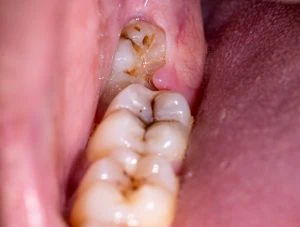Can You Get Cavities in Wisdom Teeth?
You brush, you floss, you keep your check-ups, and yet, your dentist says you have cavities in your wisdom teeth. How is that even possible? The truth is that most wisdom teeth are built to cause trouble. Their position, the way they erupt, and how difficult they are to clean make them prone to decay. We wrote this article to help you understand why cavities in wisdom teeth form and what dentists can do about them. We’ll also share tips on how to maintain good oral hygiene to prevent cavities in wisdom teeth.

Why Are Wisdom Teeth So Prone to Cavities?
Now, let’s first see why these latecomers are so susceptible to decay:
They’re Hard to Reach
Because wisdom teeth are located at the back of your mouth, cleaning them properly is difficult, and you may even forget to brush them during your daily routine. This can gradually lead to plaque buildup and cause decay.
They Don’t Always Fully Erupt
Sometimes, wisdom teeth come only partially and leave some gum tissue over the top. If food and bacteria get trapped under this flap of gum, it can create a suitable environment for cavities to form. You may also find it harder to clean partially erupted wisdom teeth because it is hard for the toothbrush to clean under the gum tissue.
They’re Often Misaligned or Crowded
When wisdom teeth don’t grow in straight, they may push against neighbouring teeth or grow at awkward angles. This crowding creates tight spaces that are hard to clean and makes it easier for bacteria to build up. It also makes them more likely to damage nearby teeth, which only adds to the problem.
Cleaning Around Them Is Awkward
Even if wisdom teeth grow in completely, they’re hard to reach and clean properly with a toothbrush or floss. Some people also have a strong gag reflex, which makes cleaning the back of the mouth even more uncomfortable. Because of this, plaque can stay there longer and can turn into cavities.
They’re the Last to Be Monitored
Because wisdom teeth usually show up later than other teeth, they may not receive as much attention compared to other teeth. You may not notice if a cavity is forming around your wisdom teeth, especially if you do not have pain at first. Plus, dentists can see some areas of decay only on dental X-rays, which means cavities may go unnoticed until they get worse.

Signs of Cavities in Wisdom Teeth
If you can catch cavities in wisdom teeth early, you can avoid bigger problems later, like pain or infection. Here’s what to watch out for:
Original: Persistent Pain: If you feel persistent discomfort or sharp pains around your wisdom teeth, it could mean a cavity is starting to form.
Original: Visible Holes or Pits: Look at your wisdom teeth carefully. Do you see any holes or rough spots on your wisdom teeth? They may be signs of cavities.
Sensitivity to Sweet, Hot, or Cold Foods: Does it hurt when you eat ice cream or drink any hot beverages, for example, a hot cup of coffee? If you notice your teeth feel sensitive when you eat something hot, cold, or sweet, a cavity might be the reason.
Swollen, Red, or Tender Gums: If you notice that the gums around your wisdom teeth have become swollen or tender or if they bleed when you brush, it could mean there’s a cavity that’s making your gums inflamed.
Bad Breath or Unpleasant Taste: Are you experiencing persistent bad breath or an unpleasant taste in your mouth that won’t improve, even after brushing? It can be a sign of decay in your wisdom teeth.
Discover key facts, tips, and insights in our guide on wisdom teeth removal in Perth.
How to Prevent Cavities in Wisdom Teeth
The best way to stop cavities in your wisdom teeth is by keeping your mouth clean and seeing your dentist regularly. Here are some easy and effective ways to keep your wisdom teeth healthy:
Thorough Brushing: Brush your teeth at least twice a day. Use a toothbrush that has soft bristles and can reach the back of your mouth without causing any discomfort. Wisdom teeth typically tend to trap more food and plaque, so make sure you brush them carefully and efficiently.
Flossing is Key: It’s important to floss daily. Pay special attention to the gaps around your wisdom teeth because food particles can easily get trapped there and lead to cavities if they are not removed.
Mouthwash for Extra Cleaning: You can rinse your mouth with antibacterial mouthwash to help remove food particles and bacteria from hard-to-reach areas around your wisdom teeth.
Regular Dental Check-Ups: Make sure you visit your dentist every six months for a professional cleaning and check-up. Your dentist can spot dental problems early and provide treatments to prevent cavities.
Healthy Diet: Eat less sugary or acidic foods and drinks because these foods can erode your tooth enamel and lead to cavities. You can choose healthier snacks instead, like fruits, vegetables, and nuts.

What Do Dentists Do If My Wisdom Teeth Are Decayed?
When your wisdom tooth has a cavity, your dentist will look at how much of your tooth is decayed and decide if it’s better to treat or remove it. Here’s what typically happens when you visit your dentist for a decayed wisdom tooth:
They Check How Bad the Cavity Is
Your dentist will start by examining your wisdom tooth closely. They usually use an X-ray to help them understand how deep the decay has gone and whether the damage has affected the roots or the surrounding bone. This helps them decide what the best treatment option is for your specific situation.
They Might Fill the Tooth
In some cases, if the cavity is small and your wisdom tooth is in a good position (fully erupted), your dentist may decide to remove the decayed part and put in a filling. This approach will only work for people whose wisdom teeth are easy to reach, and the damage has not affected much of the tooth structure and has not gone too far.
They Might Suggest Removing the Tooth
In many cases, especially if your wisdom tooth is severely decayed or is impacted, the best option is to take your tooth out. By removing a problematic wisdom tooth, your dentist can help prevent pain, infection, or further complications in the future. For patients who are scared of dental procedures, we offer Sleep Dentistry in Perth.
They’ll Consider Your Overall Dental Health
Your South Perth Dentist will typically consider what’s best for your overall dental health and won’t look at just one single tooth. If keeping the wisdom tooth might cause problems later, they might suggest taking it out, even if it can be fixed now.
Generally, because wisdom teeth are often hard to reach, misaligned, or partially erupted, wisdom tooth extraction is more common than restorative treatment.
When Decayed Wisdom Teeth Might Not Need Removal
While extracting a troublesome wisdom tooth is usually considered the best course of action, dentists may decide to keep some wisdom teeth. If your wisdom tooth has just a small and minor cavity, is fully erupted and easy to clean, and is not causing any pain, infection, damage, or crowding to the nearby teeth, dentists may decide to fill the cavity and save the tooth rather than extract it.
Please remember that, in most cases, wisdom teeth are impacted, hard to clean, or are likely to cause future problems, so extraction is typically more common.
When Decayed Wisdom Teeth Usually Do Need to Go
In many cases, treating a decayed wisdom tooth isn’t worth the potential problems it can cause in the future. Here’s when dentists will recommend removing a wisdom tooth with decay:
The Decay Is Deep or Extensive
In cases where the cavity has reached the nerve or root of your wisdom tooth, removing it will be more logical, especially if your wisdom tooth is hard to access and your dentist won’t be able to perform any treatment on it.
The Tooth Is Partially Erupted or Impacted
If your wisdom teeth are only partially erupted or trapped under the gum, they are more likely to get repeated decay and infection. In these cases, dentists recommend extracting them rather than fixing them.
It’s Hard to Clean and Likely to Decay Again
Dentists will usually extract a wisdom tooth that is located too far at the back of your mouth or is angled in a way that makes daily cleaning difficult, even if it can now be filled, because it can cause problems again in the future.
It’s Causing Pain, Swelling, or Infection
If your wisdom tooth is decayed and already causing discomforting symptoms like gum swelling, an unpleasant taste, or recurrent pain, your dentist will probably remove it to prevent further complications.
It’s Damaging the Tooth Next to It
Sometimes, a wisdom tooth that has decayed or is misaligned may start to cause trouble for the molar next to it. In that case, removing the wisdom tooth helps protect the healthy one next to it.
There’s Not Enough Space in Your Mouth
If your jaw is already crowded, keeping a decayed wisdom tooth may lead to shifting or pressure on other teeth. Your dentists often recommend wisdom tooth removal to avoid further complications.

How Regular Check-Ups Can Save Your Wisdom Teeth
It’s important that you schedule regular dental check-ups because these visits can help prevent or spot potential dental problems early and before they can turn into more significant issues in the future. Plus, your dentist or dental hygienist can clean your teeth thoroughly, including the areas that are hard to clean at home, like the back of your mouth, where wisdom teeth are located. These visits allow your dentist to evaluate your overall oral health and provide you with personalised tips, brushing techniques, the best types of toothpaste, or additional products like interdental brushes or mouthwash to help keep these areas clean.
Keep Wisdom Teeth Problems from Taking Over Your Smile
Cavities in wisdom teeth can go unnoticed until they turn into something much bigger, pain, infection, or damage to nearby teeth. If you’ve been told one of yours is decayed, it’s worth acting early. Our team offers honest advice and straightforward treatment so you can move on without the stress. Call us today to book a consultation: (08) 9474 5083.


